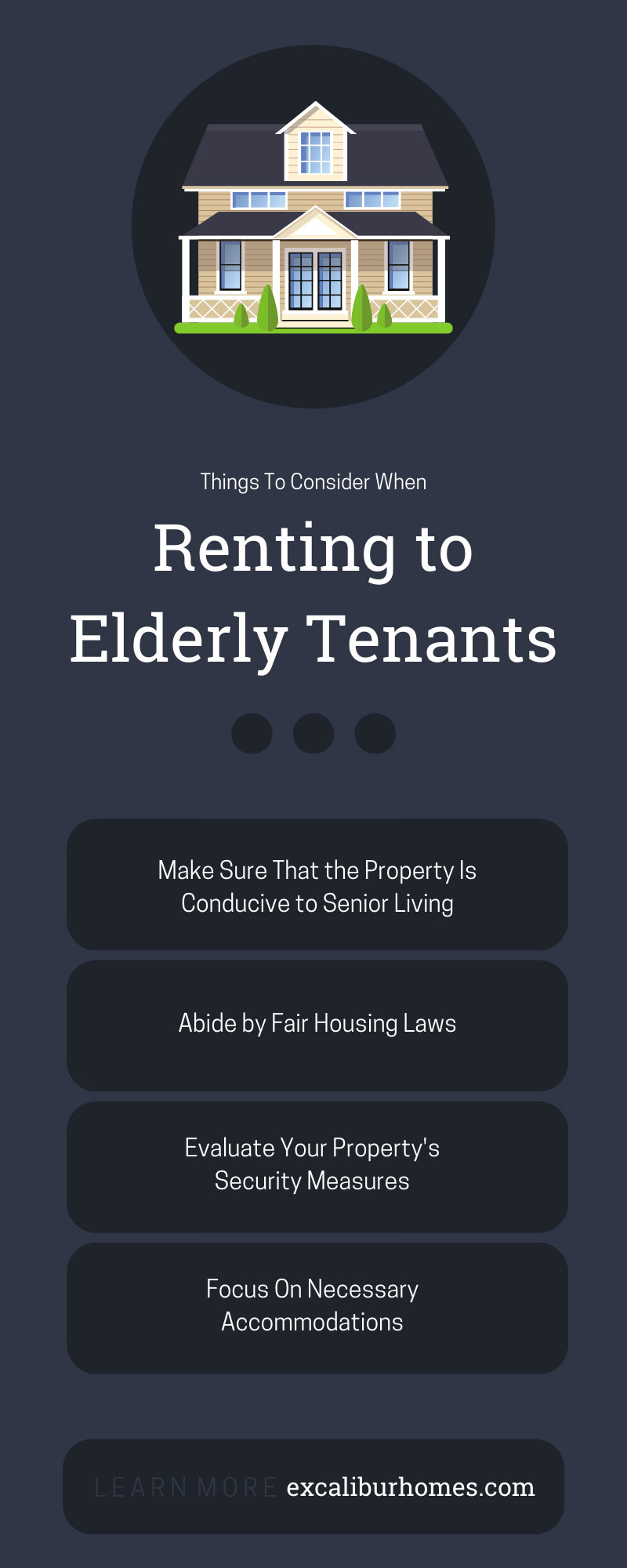
Like most people, older adults and seniors generally want a place where they can feel safe and comfortable, and if you rent to the elderly, you need to take this into consideration. Additionally, seniors are under the umbrella of protected classes in the U.S., doubly so if they are disabled or have mobility issues. Because renting out to seniors can be a bit tricky legal-wise, here are six things to consider when renting to elderly tenants.
Make Sure That the Property Is Conducive to Senior Living
Many seniors have some form of disability or mobility issue that may require certain accommodations. As a landlord, it is your responsibility to accommodate seniors and the disabled within reason. If you have a tenant that uses a wheelchair, you may need to provide them with a ramp and other wheelchair-accessible entrances and exits. You’ll also want to ensure your property is free of any obstacles, especially if you don’t have any renters’ insurance. Medical and legal fees may fall on your shoulders if a tenant has mobility issues, falls, and injures themselves due to improper flooring or a poorly graded yard.
You’ll also want to consider that some seniors may have service animals, and any clauses in your lease agreements about pets do not apply. You are also not allowed to charge the tenant a pet fee, as service animals are not considered pets.
Abide by Fair Housing Laws
As mentioned, seniors are part of a protected class. Be careful not to discriminate against them, whether accidentally or purposefully, as such discrimination is illegal according to the Federal Fair Housing Act of 1968. So, lying about a unit’s availability or pricing or refusing their application based on any protection category determined by the Fair Housing Act is illegal. You are also not allowed to inquire about a tenant’s age, as this is considered inappropriate and discriminatory questioning. It’s best to ask the same questions you would normally ask any other applicant.
The same laws apply if an elderly tenant is mentally or physically disabled. You cannot legally inquire about anyone’s disability or medical history when reviewing an applicant, as this can also be considered discriminatory questioning. Don’t ask the question if it does not directly apply to their ability to pay for the unit and abide by the lease agreement. Remember, while the Fair Housing Act is a federal law, other state and local laws are in place as added protection. It’s important to refresh your knowledge of your area’s regulations, especially when renting to any protected class.
Evaluate Your Property’s Security Measures
While you’re legally required to provide certain security and safety measures, which vary by state, you may want to reevaluate them when renting to the elderly. Not only can it make a tenant feel safer in their own home, but should an incident occur, it can protect you and the tenant. For example, if a fire, earthquake, or other natural disaster occurs, you need to have the right alarms and security measures in place.
Specifically, emergency exits should be up to code and easily opened and accessible. This is especially pertinent for elderly tenants who may have issues with vision, hearing, or mobility. If they become trapped during a fire due to a sticky door hinge, this could spell disaster for all parties involved.
You’ll also want to review the safeguards you have in place to deter thieves and prevent break-ins, as they tend to target seniors. Having security cameras, updated locks, movement-activated flood lights, or an alarm system can make your elderly tenants feel much safer. This goes back to providing the right environment; if you have an uneven walkway, you should provide the right lighting so tenants can see where they’re walking.
Focus On Necessary Accommodations
Because we live in the age of technology, many apps and websites make the process of being a landlord much smoother. However, this can be the complete opposite for elderly tenants, and in some cases, this can form a serious accessibility issue. Some seniors don’t have access to technology or don’t have the same knowledge as you. Physical applications, forms of rental payment, and other traditional landlord practices can make life a lot easier for your elderly tenants and for you as well. However, as the age of technology continues to push onward, don’t be surprised if senior tenants want the ease of online payments and applications as well.
It’s also wise to take a look at your lease agreement and see how it applies to senior tenants. For example, many elderly tenants rely on their pensions to pay off expenses, and if their rent is late because of that, you can’t fault them for it. If you don’t have a grace period in place, you should consider adding one. Additionally, it is extremely important to remember that in many states, an elderly tenant seeking to move to a care facility can legally break their lease at any time.
Pay Close Attention to the Law When Considering Eviction
Because many protections are in place for the elderly, and these protections vary by state, you have to be careful when you consider evicting an elderly tenant. Just as you’re not allowed to discriminate against them during the application process, you’re not allowed to evict a tenant based on their age or disabilities either. It’s also best to try and treat everyone with compassion, especially the elderly, as you don’t know what their situation may be, and you don’t want to rush into a decision. After all, elderly tenants tend to desire more long-term leases and are responsible, so you want to avoid evicting a good tenant without having all the information first.
Take Extra Care in Acquiring Emergency Contacts
Lastly, it is an unfortunate reality that if you rent to elderly tenants, they may pass away on your property. To make things easier for everyone involved, you’ll want to make sure that you acquire any necessary emergency contacts. If they don’t have family, they likely have a state executor you’ll need to contact. If an elderly tenant passes away on your property, it is your job to secure the property and their belongings until the next of kin or state executor claims them.
Additionally, different procedures must occur if you wish to collect rent depending on the type of lease the tenant had. For example, if they had a short-term lease, their death acts as the 30-day notice. However, regardless of the lease type, you have the right to ask for the rest of the rent from the next of kin or state executor. Many will want to end the lease, and you also have the right to grant them that and waive the rest of the payments. Or you can treat the death as a broken lease agreement and continue to ask for the rent owed.
If you keep these things in mind when renting to elderly tenants, you can make the overall process easier for you and them. And if you have a home for rent in Decatur, Georgia, and are struggling to keep up with all the laws and responsibilities required, Excalibur Homes is here to help. Here, we have experienced and knowledgeable property managers who will act as your personal service representative and help you with all your landlord needs and responsibilities.



